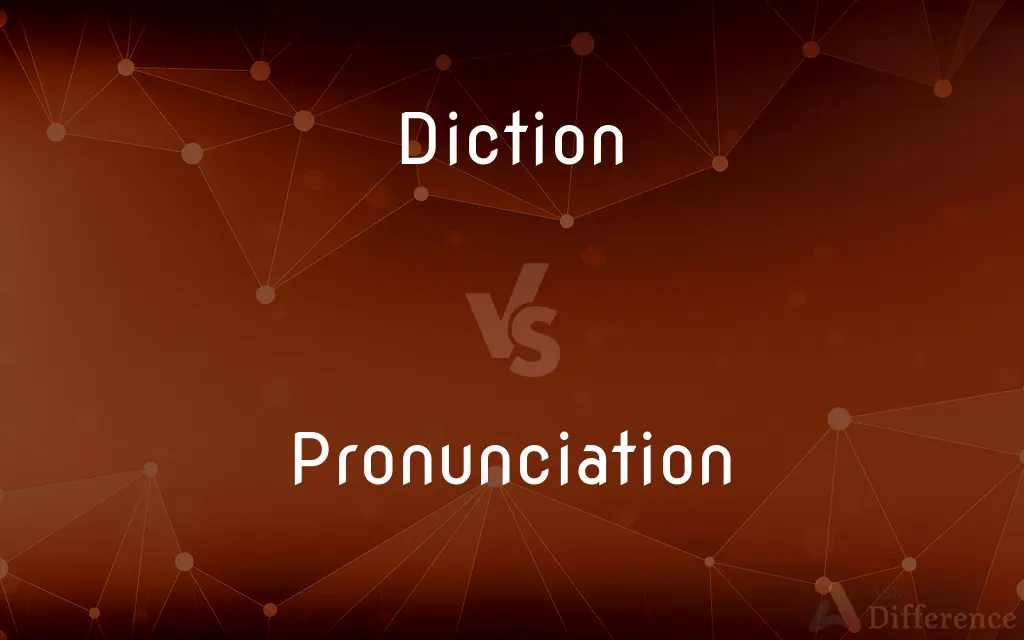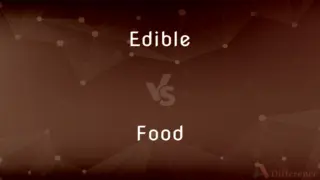Diction vs. Pronunciation — What's the Difference?
Edited by Tayyaba Rehman — By Urooj Arif — Updated on May 5, 2024
Diction refers to word choice and clarity in speech, while pronunciation is about how words sound according to phonetic norms.

Difference Between Diction and Pronunciation
Table of Contents
ADVERTISEMENT
Key Differences
Diction involves selecting appropriate words for clear and effective communication, whereas pronunciation focuses on the accurate production of speech sounds.
Good diction enhances the understandability of speech by using precise vocabulary and syntax, while accurate pronunciation ensures words are recognized and comprehended correctly by listeners.
Diction can reflect a person's education or professional background, influencing how their message is received, whereas pronunciation can reveal regional or native language influences.
In literature, diction determines the style and tone of the text, enhancing the reader's experience; on the other hand, pronunciation plays a critical role in oral traditions and performances, affecting audience engagement.
Mastery of diction is crucial for effective writing and public speaking, while excellent pronunciation is essential for clear and effective verbal communication.
ADVERTISEMENT
Comparison Chart
Focus
Choice and use of words
Making correct sounds
Impact on Language
Affects clarity and style
Affects understandability
Key Components
Vocabulary, syntax
Sound, accent, intonation
Influence Factors
Education, background
Regional dialect, first language
Importance in Medium
Critical in both writing and speech
More significant in spoken language
Compare with Definitions
Diction
Indicates the clarity with which words are chosen and used.
Her clear diction made complex topics easy to understand.
Pronunciation
The way in which words are pronounced.
His correct pronunciation of the medical terms impressed the doctors.
Diction
Refers to the choice of words in speech or writing.
The lawyer's careful diction was crucial in persuading the jury.
Pronunciation
Important for clear communication in different languages.
Learning the pronunciation of French vowels can be challenging.
Diction
Involves the style and tone conveyed through word choice.
His poetic diction added a lyrical quality to his novel.
Pronunciation
Often corrected through phonetic training.
The actor received pronunciation coaching to perfect his role.
Diction
Reflects the appropriateness of word selection.
The politician’s diction was scrutinized for appropriateness and tact.
Pronunciation
Involves articulation of sounds to form words.
She worked on her pronunciation to avoid misunderstandings.
Diction
Can signify the level of formality in language usage.
His informal diction was perfect for a casual audience.
Pronunciation
Can be influenced by regional accents.
His pronunciation revealed his New England roots.
Diction
Diction (Latin: dictionem (nom. dictio), "a saying, expression, word"), in its original meaning, is a writer's or speaker's distinctive vocabulary choices and style of expression in a poem or story.
Pronunciation
Pronunciation is the way in which a word or a language is spoken. This may refer to generally agreed-upon sequences of sounds used in speaking a given word or language in a specific dialect ("correct pronunciation") or simply the way a particular individual speaks a word or language.
Diction
Choice and use of words in speech or writing.
Pronunciation
The way in which a word is pronounced
Similar pronunciations are heard in Ulster
Spelling does not determine pronunciation
Diction
Degree of clarity and distinctness of pronunciation in speech or singing; enunciation.
Pronunciation
The act or manner of pronouncing words; utterance of speech.
Diction
Choice and use of words, especially with regard to effective communication.
Pronunciation
A way of speaking a word, especially a way that is accepted or generally understood.
Diction
The effectiveness and degree of clarity of word choice and expression.
His poor diction meant that most of the audience didn't really understand the key points of the presentation.
Pronunciation
A graphic representation of the way a word is spoken, using phonetic symbols.
Diction
(theatre) Enunciation, pronunciation.
Pronunciation
(countable) The formal or informal way in which a word is made to sound when spoken.
What is the pronunciation of "hiccough"?
Diction
Choice of words for the expression of ideas; the construction, disposition, and application of words in discourse, with regard to clearness, accuracy, variety, etc.; mode of expression; language; as, the diction of Chaucer's poems.
His diction blazes up into a sudden explosion of prophetic grandeur.
Pronunciation
(uncountable) The way in which the words of a language are made to sound when speaking.
His Italian pronunciation is terrible.
Diction
The articulation of speech regarded from the point of view of its intelligibility to the audience
Pronunciation
(countable) The act of pronouncing or uttering a vocable.
Diction
The manner in which something is expressed in words;
Use concise military verbiage
Pronunciation
The act of uttering with articulation; the act of giving the proper sound and accent; utterance; as, the pronunciation of syllables of words; distinct or indistinct pronunciation.
Pronunciation
The mode of uttering words or sentences.
Pronunciation
The art of manner of uttering a discourse publicly with propriety and gracefulness; - now called delivery.
Pronunciation
The manner in which someone utters a word;
They are always correcting my pronunciation
Pronunciation
The way a word or a language is customarily spoken;
The pronunciation of Chinese is difficult for foreigners
That is the correct pronunciation
Common Curiosities
Can good diction compensate for poor pronunciation?
Good diction improves clarity, but may not fully compensate for poor pronunciation which can hinder understandability.
What is diction?
Diction is the choice and use of words in speech or writing to convey a specific style or tone.
What is pronunciation?
Pronunciation refers to the way in which words are made to sound when spoken.
How does diction differ from pronunciation?
Diction focuses on word choice and clarity, whereas pronunciation concerns the accurate sound of words.
Why is pronunciation important?
Proper pronunciation ensures that spoken words are understood correctly by listeners, facilitating effective communication.
Does diction affect a writer’s style?
Yes, a writer’s choice of words (diction) significantly influences the style and tone of their writing.
How does diction contribute to effective communication?
Clear and appropriate diction enhances the effectiveness of both spoken and written communication.
How can one improve their diction?
Improving diction involves expanding vocabulary and practicing precise word choice according to context.
What role does pronunciation play in learning a new language?
Accurate pronunciation is crucial in learning new languages as it affects both speaking and listening comprehension.
Can diction reflect someone's personality?
Yes, the way individuals choose and use words can reflect their personality and level of formality.
Is pronunciation the same across all dialects of a language?
No, pronunciation can vary significantly across different dialects of the same language.
What are common mistakes in pronunciation?
Common mistakes include mispronouncing vowels, consonants, and stressing the wrong syllables.
Does pronunciation influence public perception?
Yes, pronunciation can influence how individuals are perceived in terms of intelligence and social status.
Share Your Discovery

Previous Comparison
Benefit vs. Importance
Next Comparison
Edible vs. FoodAuthor Spotlight
Written by
Urooj ArifUrooj is a skilled content writer at Ask Difference, known for her exceptional ability to simplify complex topics into engaging and informative content. With a passion for research and a flair for clear, concise writing, she consistently delivers articles that resonate with our diverse audience.
Edited by
Tayyaba RehmanTayyaba Rehman is a distinguished writer, currently serving as a primary contributor to askdifference.com. As a researcher in semantics and etymology, Tayyaba's passion for the complexity of languages and their distinctions has found a perfect home on the platform. Tayyaba delves into the intricacies of language, distinguishing between commonly confused words and phrases, thereby providing clarity for readers worldwide.
















































